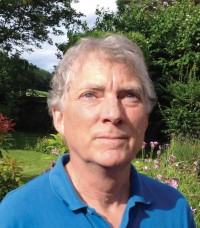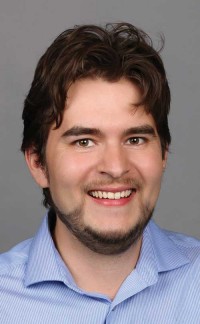 Social Sciences
Social Sciences
Evans and Evans and Economics
Economics professor George Evans now sees a familiar face in weekly meetings with colleagues: his son, David Evans, a new assistant professor in the department.
 The younger Evans joined the university last year, bringing expertise in macroeconomics, taxation, and computational economics.
The younger Evans joined the university last year, bringing expertise in macroeconomics, taxation, and computational economics.
“It’s not often that sons or daughters follow as academics in the same field as one of their parents,” said Bruce Blonigen, associate dean of social sciences and an economics professor. “It would be even more unusual that you’d have them in the same department.”
In fact, there will be overlap for the Evans and Evans wing of UO economics. Both merge macroeconomics—which deals with the economy as a whole—and microeconomics, which is the study of individual behaviors such as spending and saving. Father and son are already working on a joint research project with Bruce McGough, an associate professor; the trio is looking at how people decide whether to accept a job offer, particularly if they are unemployed.
Those who are employed, meanwhile, often become the subject of George Evans’ work. The John Hamacher Chair in Economics studies a question shared by everyone from low-wage earners to captains of industry: how much to save.
George Evans (above) has long examined how people make this decision, based on what they have seen from markets in the past and what they expect in the future. He has juxtaposed such decision-making with that by policymakers attempting to steer the economy.
In a recent paper, Evans found that people trying to balance expected returns and risk can actually trigger booms and busts of the stock market. “It’s hard to decide on a level of savings,” George Evans said, “not to mention how to invest the savings in different assets. And collective decisions about savings can have major effects on the economy.”
In a similar vein, David Evans (below) studies entrepreneurs and how they pick their investments, given market risks.
 The younger Evans comes by way of the PhD program at New York University, where he trained with one the world’s leading economists—Thomas Sargent, regularly cited on macroeconomics and other topics. Sargent, who has also worked with George Evans, won a 2011 Nobel Prize for his research on cause and effect in the macroeconomy.
The younger Evans comes by way of the PhD program at New York University, where he trained with one the world’s leading economists—Thomas Sargent, regularly cited on macroeconomics and other topics. Sargent, who has also worked with George Evans, won a 2011 Nobel Prize for his research on cause and effect in the macroeconomy.
Sargent served as David Evans’ advisor and held a weekly reading group that was invaluable for the aspiring academic. Each week, Evans and his peers summarized a research paper in concise presentations to Sargent and the rest of the group.
“Tom has produced some incredibly influential pieces of research that changed the field of economics,” David Evans (right) said. “But he is also an incredibly influential mentor. Most prominent universities have professors who have been one of Tom’s students; being one of Tom’s students myself puts me in contact with this network of brilliant researchers.”
David Evans also brings talent in using supercomputers to solve economic problems. Currently, he is exploring how the economy is affected by governments that suspend debt repayment.
“We’ve hit a wonderful point in time,” David Evans said, “when our tool set is getting better.”
George Evans has another son, but he’s not on a track to join his dad and brother in economics at Oregon. Marc Evans is a graduate student in music composition at the University of California at Santa Barbara.
“He has a good intuitive sense about economics so I have occasionally said, ‘You know, as a fallback, you might consider economics,’” George Evans said, laughing. “He hasn’t shown any interest in that.”
—Dylan Darling


 Twitter
Twitter Facebook
Facebook Forward
Forward